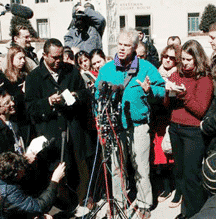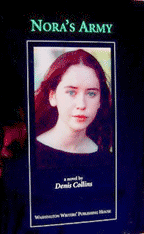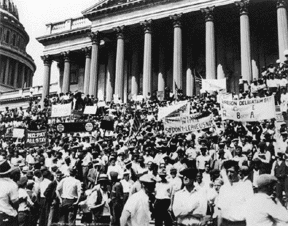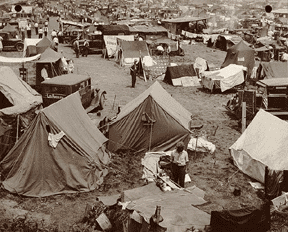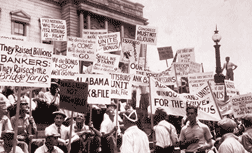 |
|||||||||||
|
|||||||||||
|
|||||||||||
|
Only In America Journalist and author Denis Collins was used to writing other people’s stories. His first novel, Nora’s Army, tells the tale of the thousands of desperate U.S. veterans that invaded Washington in 1932. But as Juror Number Nine in the high-profile case of White House Aide Scooter Libby, Collins was part of the story. a Bay Weekly Conversation with Denis Collins and staff writer Margaret TearmanAuthor, journalist — and juror — Washingtonian Denis Collins has a couple of stories to tell.He brought those stories to the Prince Frederick Library this fall for a Meet the Author evening. It’s too bad more readers didn’t get to hear Collins spin his yarns, for the handful of listeners was charmed by his storytelling. I left wanting to hear more about this author’s fascinating family and to learn more about this — new-to-me — role our veterans played in American history.Collins’ patrimonial story is the unconventional identification his Irish immigrant father felt with African Americans in a time when races rarely kept mixed company. Collins then likes to tell how his own integrated upbringing directed his education and eventually led him down his unplanned career path.Collins also has a very public story to tell: How he, an established and well-connected journalist, became Juror Number Nine and spokesperson for the jury after the verdicts in the highly publicized 2007 trial of White House aide Scooter Libby, who was charged in the outing CIA agent Valerie Plame.Just in time for Veterans Day is the story of Nora’s Army, Collins’ first novel, a weaving of real people and fictional characters around a chapter of American history. In the novel, a young Irishwoman travels to America during the Depression in search of something stolen from her. Once in D.C., Nora finds herself in the company of some unlikely allies — and a large contingent of World War I veterans.A common thread runs through all of Collins stories: Only in America.
Bay Weekly: Isn’t it odd for a journalist to be chosen as a juror, especially for such a high-profile case as the Scooter Libby trial? Denis Collins: I had been summoned [to jury duty] six times before but never been chosen. I assumed a reporter’s background wouldn’t be something they would want, especially since reporters were such a large part of this case. Bay Weekly: Did you think you had a chance to make the jury? Denis Collins: I didn’t think so. I jokingly bet [another prospective juror] $1,000 I wouldn’t get on. Three days later, when we were both chosen to serve as jurors, she asked Where’s my money? I didn’t want to spend seven weeks in a small room, but I told them I thought reporters would be perfect jurors. We are, hopefully, trained to look at things dispassionately. Bay Weekly: I want to know more about the trial, but now, tell me about the hot dog vendor on the street below the room where you deliberated and the role he played in this high-stakes political trial … Denis Collins: We were all obsessed with the hot dog cart outside our window. The food we were given was good but it was the same, day after day. We were all really jonesing for a hot dog or half smoke. My father’s first job after he came from Ireland in 1932 was making sandwiches very close to where the hot dog vendor was, across the street from the courthouse. Lawyers and judges would come in to the shop. My dad was 17. A judge told him You are a good talker, and that’s pretty much what lawyers do. You should be a lawyer. Four days later, my dad enrolled in Catholic U and became a lawyer. Only in America. Bay Weekly: Your book, Nora’s Army, is set in Washington, D.C., in 1932. It’s a novel based on historical events and people during the Bonus Army march on the capitol. Denis Collins: I grew up in D.C. and never heard of the Bonus Army. I first learned about it reading about the Depression. In this big camp, blacks and whites lived in total integration. They cooked together and defended each other. I responded immediately to this.
Bay Weekly: What attracted you? Denis Collins: It struck a chord because my father, unlike any person I ever knew, had a great regard for black people. In the late 1950s, he routinely brought home a black person he met during the day — on the bus, on the street — for dinner. Bay Weekly: Your father is your big story. Tell us about him. Denis Collins: When he first got to Ellis Island from Ireland, he heard people talking negatively about black people. He told me it was the same pack of lies the British always said about the Irish, and he totally identified with blacks. And he did what he could to help them. Our school, Nativity Catholic, needed a basketball coach. My dad told Skip Grant [a black friend] he should do it. Skip said he didn’t know anything about coaching. My dad told him It’s not what you know, it’s who you are. You should be working with kids. Skip got the job and went on to be one of St. Alban’s legendary track and field coaches. When my dad died, I was greeting mourners at his wake. Three 20-something black guys in suits came up to shake my hand. I asked them how they knew my dad. They laughed. He never told you about us? Your dad put us through college. My dad also took kids from the city on Chesapeake Bay cruises to get them out of the city and teach them a little about the natural world. Bay Weekly: Now tell us about the Bonus Army. Denis Collins: In June of 1932, some 40,000 or 45,000 World War I vets marched on Washington seeking immediate payment of a cash bonus voted by Congress in 1924 for their service. The bonus was not supposed to be paid until 1945 but the vets, in middle of the Depression, needed money then. The Bonus Army set up camps outside of D.C. by the Anacostia River. Women and children were living in this camp. Army Chief of Staff Douglas MacArthur feared the veterans were controlled by communists and would turn violent. He decided they had to be removed. Disobeying direct orders from President Hoover, he drove the veterans out of the city and burned the camps. The integration in the Bonus Camps led J. Edgar Hoover and others to conclude that communists were behind it. This wasn’t true, but Hoover began a nation-wide intelligence operation to investigate the Bonus Vets. I think the passion of this event assisted in the passage of the GI Bill in 1944. Any soldier serving today should read about the Bonus Soldiers. They owe those vets some gratitude.
Bay Weekly: Your novel includes real people, like Eric Sevareid, General MacArthur and D.C. Police Superintendent Pelham Glassford. How did you decide who got in? Denis Collins: Sevareid was easy. In my Washington Post outdoors column, I wrote about a 750-mile canoe trip I took through Canada. When I got back, Sevareid had sent me a note. He liked my stories; they reminded him of a trip he did. He wanted to have lunch and talk about it. But I blew my chance. When I was sent away on another assignment, I dropped the ball and never met him. He was so impressive. I read in his obituary that he took a 2,300-mile canoe trip from Hudson Bay to Minnesota. As a young man he went to California to try his hand at gold mining. He decided during the Depression he wanted to see poverty in America, so he hopped trains and traveled all over. He was a hobo. Eventually he became a reporter, but he wasn’t in D.C. covering the Bonus Army. I needed a character who could go places, get behind police ropes. This was my way of having a conversation with him. Bay Weekly: One of the book’s main characters is Randolph Walker based on Johnny Spain, a real person and former Black Panther. Denis Collins: Spain was this suburban Baltimore kid, raised as a white. At age 10 or so, Spain’s father discovered he was the result of an affair his mom had with a black man. Disgusted, Spain’s father sent him to Oakland, California, to live with his black paternal grandparents. So one day he is a white kid, the next day he’s black. He didn’t know where he fit. When I read about him, I thought Wow! I changed details but kept his situation the same. Because I spent three years writing about the outdoors, I knew I wanted Randolph beside the Potomac River. He withdraws to the river and starts learning about the outdoors. He worked well, because, like my father, he developed an immediate affection for blacks in general. Bay Weekly: Another character is Pelham Glassford, the D.C. police superintendent in 1932. Denis Collins: Glassford was unbelievably attractive because of his background in World War I. He did really impressive things. He was a captain in the war, leading an artillery unit without any artillery. He and his men became sharpshooters using long-range canons as if they were rifles. He was the youngest brigadier general in the army. He was a beloved leader. When the Bonus Army came to D.C., the district commissioners wanted the bums outta here; it’s bad for tourism. Glassford stood up for the vets; he felt they were within their rights. He went out of his way to get food and shelter for them; even had an army band play one night. One of Glassford’s enemies was MacArthur; Glassford tried to prove to MacArthur he was wrong. I couldn’t have invented a better police superintendent. Bay Weekly: The title character, Nora, is a 17-year-old Irish girl who travels to America in 1932. She is based on your father? Denis Collins: Yes, but he didn’t come to America chasing anyone. My father was a good example of an immigrant, but it is the story of America. When the Irish came to America, there were signs No dogs or Irish allowed. The Irish were considered poor and ill mannered. My father grew up on a farm; he was a hard worker. When I was writing this book, I was always coming across immigrants serving in the army. The immigrants felt this was the way to become an American, and they risked their lives for their new country. I wanted to try and give all these characters what was due them and not make them into stereotypes. Bay Weekly: Your father’s affinity for blacks eventually led to your first job at The Washington Post. Denis Collins: I went to [mainly black] Talladega College in 1967 as an exchange student. I wanted to be a writer, and in the late 1960s, race and civil rights were what everyone was writing about. So I went to Talladega to see things for myself. My father was proud. After college, I needed a job. It was 1973. I was hitchhiking up 16th Street in D.C. An electrician from The Washington Post picked me up. When he told me where he worked, I asked him if the Post was hiring. He said he knew of one job there, took me to the building, got me in and gave me an application. I filled out the application and this very gracious guy took me to see the personnel manager. I still didn’t know what the job was. The Post personnel guy wasn’t exactly pleased to see me, wondered what I was doing there. He looked at my application, and when he got to the part that said I went to Talladega, he stopped. He said Isn’t this a black college? So you get along with black people? When I said I did, he hired me. At the time, the Post’s pressroom was segregated. The paper handlers, the lowest rung, were all black. The pressmen were all white. They hired me as a paper handler to integrate the pressroom. Bay Weekly: How did you go from the pressroom to reporter? Denis Collins: I saw an application for two-year internships. I thought this would be a good way to learn reporting. But there was a lot of empty white space reserved for journalism experience. I had nothing. I had two days to come up with some story to submit with my application. I asked all my friends if they had any ideas, and ended up with a story about a Chesapeake Bay skipjack and another about five- and six-year-old kids in Prince Georges County who boxed every night with 300 adults screaming for them. I wrote them as short stories and submitted them with my application. Dan Graham, Katherine’s son, called me in. He said You’re not getting this internship, but I like your writing, it’s different. This story about the kids. If you go out and do some more work on it, we’ll publish it. I did, assuming it would run in the sports section. Five days later, one of the paper handlers walked up holding the paper and said Hey Collins, look at this. Some dude with your name is writing for the paper. I had made the front page of Metro, top of the fold. As a result of that story, other editors asked me to bring them stories. In 16 months, I had 75 stories published. So my dad and his affection for black people, my going to a black college: I owe my career to it all. Bay Weekly: Is there another book in the works? Denis Collins: Yes. My wife’s brother is a voice coach. He has famous students like Aerosmith’s Steven Tyler, but also nobodies who come to him. Over the years he’s told me some great stories, so I’m writing a novel about a voice teacher. I’m also teaching creative writing to inner city kids in D.C., which is something that I get a lot from, and the kids benefit, too.
Bay Weekly: How about the Scooter Libby trial? Are you planning a book about your jury experience? Denis Collins: No. I did write a piece for The Washington Post Outlook section and a fairly long piece for the on-line Huffington Post. I won’t write a book, mostly because I know the other members of the jury don’t want all of our conversations on display. The only thing that would make my book interesting is what happened in the jury room, and I won’t go there. We bonded; I love these people. Bay Weekly: By the way, how did you handle the role reversal of speaking to the press on behalf of the jury? Denis Collins: I tried to avoid being a part of the story. When the trial ended there was a swell of emotion; there were tears. One juror in particular was extremely bright and well spoken. She was the Mrs. Smith who goes to Washington. I thought she should be the one to talk to the press. But at the last minute, she felt she couldn’t do it. So I did. We were paid by the citizens of the United States to do this job, and they deserved to know how we did it and that we did it well. I declined the TV people crowding me to go on their shows. At home, CNN was waiting, Larry King Live. Every juror would be hounded, I was told, until someone agreed. So I agreed. I also agreed to Anderson Cooper and two other shows. At the end of the last show, I said on camera: I’m officially resigning from show business right now. I pulled the plug on myself.
|
|||||||||||
|
|||||||||||
|
|
|||||||||||
|
© COPYRIGHT 2007 by New Bay Enterprises, Inc. All rights reserved.
|
|||||||||||

